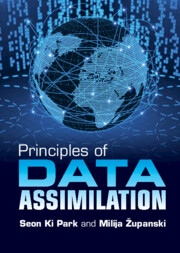Book contents
10 - Dynamics and Data Assimilation
from Part III - Methods and Issues
Published online by Cambridge University Press: 22 September 2022
Summary
Probabilistic prediction in terms of the probability density function and using Kolmogorov equation is introduced. The error of probabilistic prediction is defined, and its growth further analyzed using normed measures. Error growth is also connected with the Lyapunov exponent to underline its relevance to chaotic dynamics. Furthermore, the forecast and analysis errors of recursive data assimilation are mathematically related to the Lyapunov exponent, with implications for the control of errors of dynamical imbalances. It is shown how errors propagate in a data assimilation system and that the control of unbalanced errors is critical for successful data assimilation. In addition, Bayesian inference was identified as a mechanism that can help in implicitly controlling the growth of errors. A practical approach of dealing with dynamical imbalances in data assimilation using penalty function is also presented and briefly discussed.
Keywords
- Type
- Chapter
- Information
- Principles of Data Assimilation , pp. 251 - 262Publisher: Cambridge University PressPrint publication year: 2022

